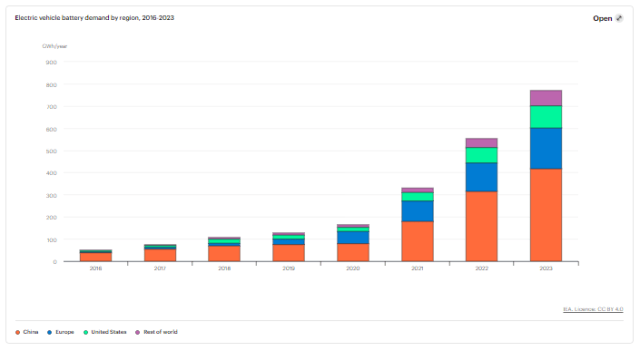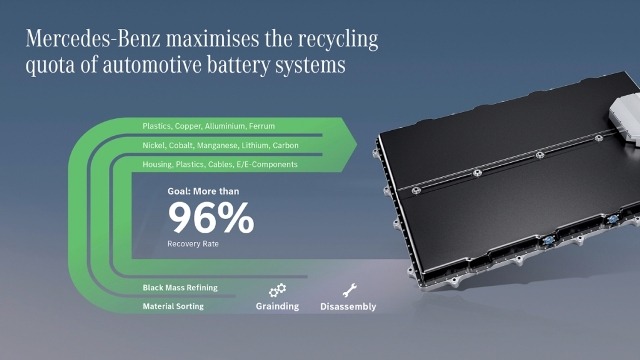Mercedes-Benz plans to invest €14 billion in 2024, focusing on research and development, and enhancing its production facilities. A substantial portion of this investment will target the advancement of batteries and electric drive systems.
EV battery growth
The latest report from IEA (International Energy Agency) says the global demand for EV batteries has reached more than 750 GWh in 2023, up 40 percent. Electric cars account for 95 percent of this growth. China (415 GWh), Europe (185 GWh) and the United States (around 100 GWh) are the leading EV battery markets in 2023.

Mercedes-Benz’s eCampus
The automaker has inaugurated the eCampus at its headquarters in Stuttgart-Unterturkheim, dedicated to the development of electric vehicle batteries. This initiative aims to innovate chemical compositions and optimize production processes for high-performance cells with “Mercedes-Benz DNA,” aiming to cut EV battery costs by more than 30 percent in the coming years.
Mercedes-Benz’s eCampus encompasses all aspects of battery and cell technology, from developing new cell chemistries and industrial-scale cell production to testing and certifying complete battery units. The automaker did not reveal the employment opportunities at the center.
“eCampus will help to reduce battery costs by more than 30 percent in the coming years. By locating the eCampus at the heart of our centre for research and development of drive systems, it signifies a clear commitment to a more sustainable future,” said Ola Kallenius, Chairman of the Board of Management of Mercedes-Benz Group.
Mercedes-Benz is exploring various cell chemistries, including lithium-ion cells with high-energy anodes based on silicon composites, cobalt-free cathode chemistries, and solid-state battery technology. The competence center for battery technologies at the Stuttgart-Unterturkheim plant will begin operations in two phases. The 10,000-square-meter facility for industrial battery cell production has commenced operations following a two-year construction period.

Since 2022, Mercedes-Benz’s production sites have been net carbon neutral. By 2030, the company plans to meet more than 70 percent of its production energy needs through renewable energy sources, achieved by expanding solar and wind energy installations and entering power purchase agreements. The goal is for all Mercedes-Benz production plants worldwide to operate on 100 percent renewable energy by 2039.
Going slow
According to a Reuters news report, Mercedes-Benz will not expand its battery cell capacity until there is a clearer indication of increased demand for electric vehicles (EVs). This decision follows a revision of the company’s EV sales projections for 2030, reducing the need for the initially planned capacity, as stated by Chief Technology Officer Markus Schaefer.
In 2022, Mercedes-Benz anticipated a requirement for over 200 gigawatt hours (GWh) of battery cell capacity by the decade’s end, planning to construct eight cell factories worldwide, including four in Europe, in collaboration with various partners. However, lower-than-expected EV demand has led to adjusted sales forecasts. The company now expects electrified vehicles, including hybrids, to constitute up to 50 percent of its total sales by 2030, a significant delay from the previous target of 2025.
Mercedes-Benz had secured a deal with CATL in 2022 to source battery cells from the Chinese company’s 100 GWh plant in Hungary, though specific details of the agreement were not disclosed. Additionally, it will source cells from a 40 GWh plant in France through a joint venture with ACC, in which it holds a 30 percent stake. Plans to build two more ACC plants in Germany and Italy were put on hold last month due to sluggish EV demand. The automaker also maintains supplier relationships in the U.S. and China.
Baburajan Kizhakedath

